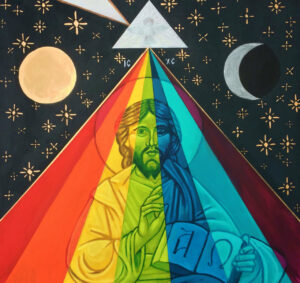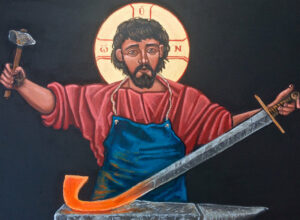![]()
In this series, we will explore six portals into the heart of Jesus, which also serve as foundational values around which our lives are shaped. The six are: Belonging, Formation, Wilderness, Wonder, Solidarity, Restoration. We will explore these six values through teaching and also through the practice of Visio Divina. Latin for “divine seeing,” Visio Divina is a spiritual practice that involves contemplating the glory of God through sacred art. Christians have been creating sacred art since the time of Jesus, but “icons” are religious paintings which are said to be “written,” not painted, specifically for use in worship and spiritual practices. This series will incorporate six icons written by artist Kelly Latimore.
The English word “icon” comes from the Greek word εἰκών (eikōn), pronounced “i-kone.” Both mean image or likeness. In the ancient world, it literally referred to a statue or an idol. Metaphorically, it referred to a representation or a resemblance. The Hebrew Bible begins with an audacious claim: all human beings are created as icons of the the One True, Living Creator God. Set against the historical and cultural context of the ancient Near East, this claim was revolutionary, since in all the surrounding cultures, only kings and rulers like the Egyptian Pharaoh were considered the “image” of a god. The image of God, then, is less about physical resemblance but about a representative role. Human beings have been called to represent the Creator to the creation and to one another. Human beings are God’s co-rulers or ‘vice-regents’ in the world.
It is from this revolutionary understanding of humanity, that new ethics are formed about the treatment of human beings. Universal human dignity and human rights flow from the precept of the Imago Dei (Latin for “image of God”). But the richness of the Imago Dei doesn’t end with improved social ethics. It also helps us to understand a crucial way we are being formed. “We become what we behold.” That which we contemplate, meditate upon, and place our trust in forms us (e.g. Psalm 135:15–18). Thus, the Hebrew Bible continually instructs God’s people to contemplate God’s attributes, mighty deeds, and especially God’s law.
The New Covenant develops the Imago Dei even further with the Incarnation of the Son of God. While sin has tarnished the image of God in human beings, Jesus Christ is both fully human and fully divine, the perfect image of God for humans, and the glory of God. Through contemplation of Jesus we are being formed more and more into the image of Jesus and the Imago Dei is being restored in us.







